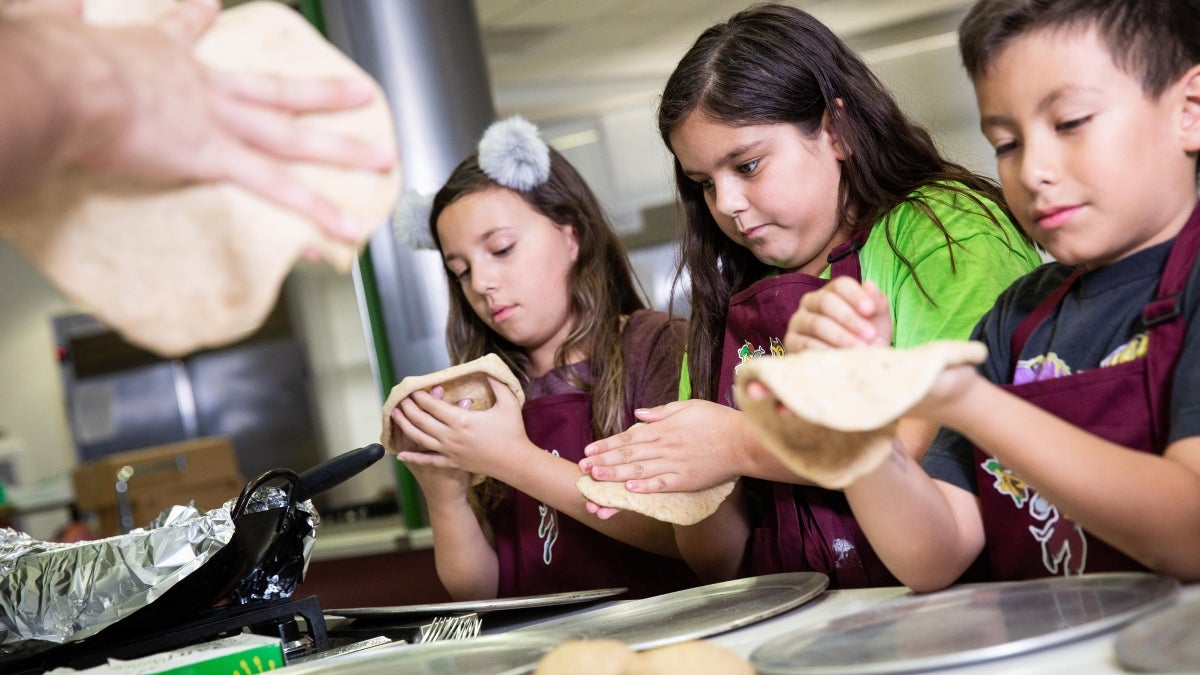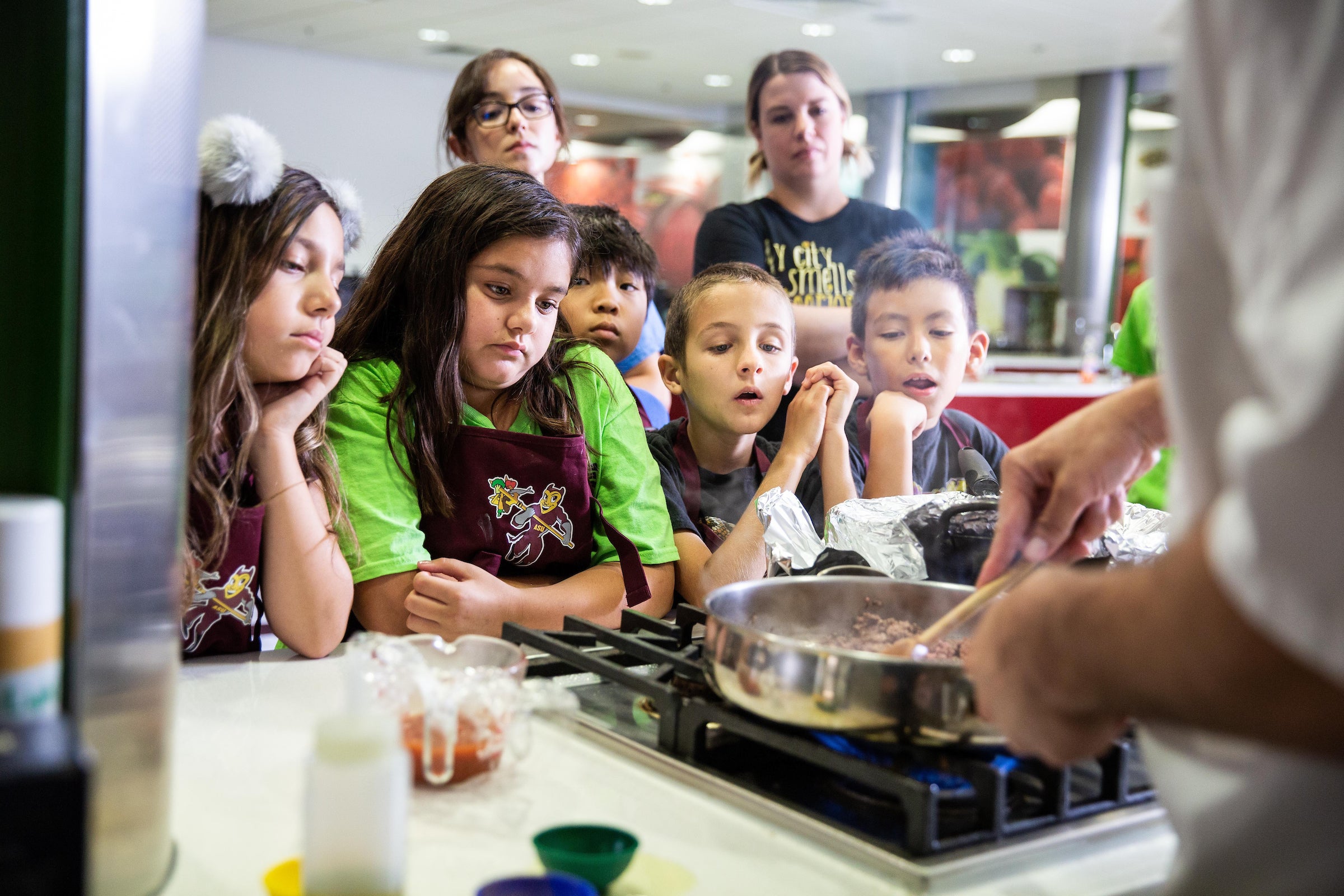Research shows that the earlier kids are exposed to healthy lifestyle habits, the more likely they are to be healthy adults. Professors and researchers at Arizona State University’s College of Health Solutions are putting that knowledge to practice in a variety of ways, from summer camps that teach children about nutrition and physical activity to giving school lunchrooms a healthy makeover.
“At a young age, kids are still forming habits, so it’s important to give them tools and teach them how to engage in physical activity and have a basic understanding of nutrition and health that they can take with them to adulthood,” said Christy Alexon, School of Nutrition and Health Promotion clinical associate professor.
Craving nutrition knowledge
On Friday, Alexon looked on as kids from the Phoenix area gathered in the Instructional Nutrition Kitchen on ASU’s Downtown Phoenix campus to learn about Egyptian food and make their own flatbread sandwich as part of the College of Health Solutions’ annual Camp CRAVE, for which Alexon serves as faculty adviser.
Dakotah Beck, 10, who attends Vistancia Elementary in Peoria, watched carefully as kitchen coordinator Kent Moody demonstrated the smack-and-spread technique to thin out the flatbread dough. Earlier in the week Dakotah and other kids at the camp learned about portion control, whole grains and water-based veggies that can help with hydration.
Video by Deanna Dent/ASU Now
Dakotah likes apples and bananas but was a bit skeptical of the squash that was mixed in with the basmati rice as a side dish to the flatbread sandwiches on Friday — but she tried it anyway.
“Dare to try new things,” she said as she spooned some of the veggie-infused rice onto her plate. Being adventurous is part of Camp CRAVE’s philosophy.
“There may be foods they think they don’t like, but we show them different ways to prepare it that they find out they actually enjoy,” Alexon said.
Innovation in the cafeteria
Cameron Scholtz, a graduate student in exercise and nutritional sciences at the College of Health Solutions, said the number of kids in America who don’t get enough fruits and veggies is appalling: He has seen recent stats that put it at about 75 percent.
At Camp CRAVE this summer, Scholtz is pilot-testing a research project that will kick off this fall in which a “flavor station” will be implemented at salad bars in elementary school lunchrooms. The flavor station will feature condiments and toppers like peanut butter, yogurt, hummus and sriracha in an effort to encourage kids to consume more produce.
Scholtz and his team will compare the weight of the produce in the salad bar before and after kids’ lunch hour, and subtract whatever fruits and veggies found their way into the trash, then divide by the number of kids to get an average of how much fresh produce each child consumed.
“We’re hoping it will increase consumption and decrease waste,” he said. “It’s eye-opening how much food is wasted.”
Recently, Scholtz completed a similar intervention that replaced ordinary black and gray serving utensils at school cafeteria salad bars with brightly colored ones. He found that the simple act did increase the amount of produce kids put on their plate.
The best part about that kind of intervention? “It’s sustainable,” he said.
Students watch chef Kent Moody prepare ground beef for an Egyptian-style kofta sandwich during Camp CRAVE on June 15. Photo by Deanna Dent/ASU Now
Taking that idea a step further, Scholtz and his team livened up lunchrooms with full-wall murals depicting fresh fruits and vegetables to create a more exciting environment for kids. Afterward, they saw about a 10 percent increase in the amount of fruits and veggies consumed.
“The increase is small, but that small change can move the curve enough to improve health across the population level,” Scholtz said.
Seeking solutions on many fronts
Other College of Health Solutions researchers doing work in elementary school cafeterias include Assistant Professor of nutrition Meg Bruening and Assistant Professor of exercise science and health promotion Marc Adams. Last September the pair received a $2 million grant from the National Heart, Lung and Blood Institute to conduct a four-year study on the efficacy of salad bars in school lunchrooms.
Building on previous research published in 2016, the study will look at the effects of lunchroom interventions by age group. More specifically, they’ll be looking at how simply having a salad bar available, along with promotional materials to encourage healthy eating, affects consumption of fresh produce.
And in November of last year, nutrition Professor Punam Ohri-Vachaspati published a study that found legislation that made critical nutrition reforms to school lunch and breakfast programs was not only effective, despite opposition and claims to the contrary, but in some cases actually increased kids’ participation in school meal programs.
Back at Camp CRAVE, nutrition undergrad and camp organizer Heather Schwartzmeyer laughed as camp participant Noah Hargis, 9, dictated instructions to her while stirring the ground-beef filling for his flatbread sandwich.
Schwartzmeyer has been involved with the camp for two years now. When she graduates in December, she’s thinking of becoming a dietitian for the Department of Veterans Affairs but wants to continue working with Camp CRAVE because of how rewarding it is to see the kids’ enthusiasm for learning important skills about nutrition and healthy lifestyles.
“Some of these kids have never cooked before,” she said. “So to see the raw excitement they have is just great.”
Top photo: Students Chloe Appel, Dakotah Beck and Noah Garay roll out their flatbread for their Egyptian-style kofta sandwich during Camp CRAVE on Friday June 15, 2018 at the Downtown Phoenix campus. Photo by Deanna Dent/ASUNow
More Health and medicine

Human-centered technology embraced at ASU Digital Health Summit
Digital health technology is advancing at lightning speed, but the innovation requires a human touch to ensure that everyone benefits from the advances, according to speakers at the inaugural ASU…

Ancient DNA could help to understand recent tuberculosis outbreak in Kansas
For over a year, Wyandotte and Johnson counties in Kansas City, Kansas, have been fighting an outbreak of tuberculosis (TB) that has claimed two lives and infected nearly 150 residents. The…

ASU researchers propose unifying model of Alzheimer’s disease
In a groundbreaking theory, scientists at Arizona State University's Biodesign Institute propose a unifying explanation for the molecular chaos driving Alzheimer's disease. The condition causes…

